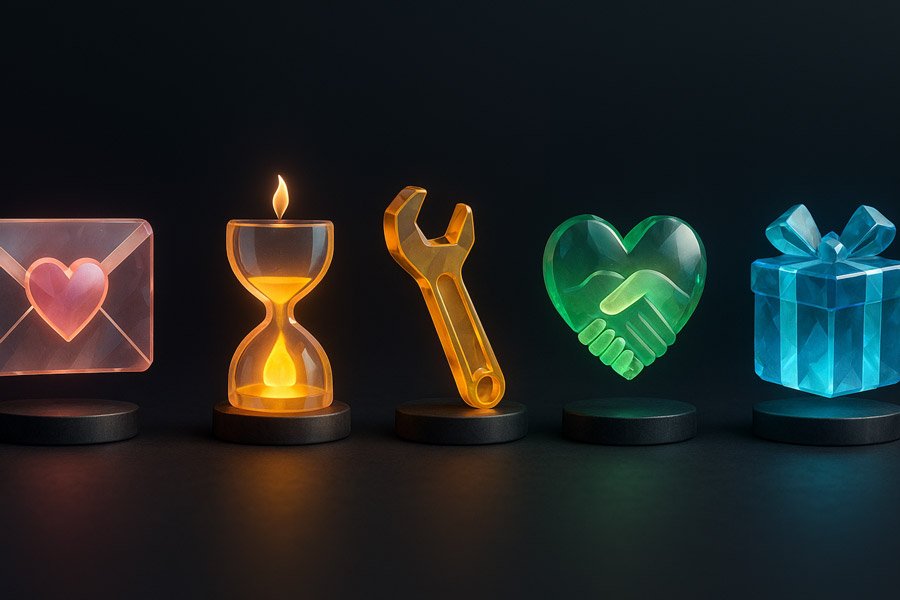Ever felt like you’re trying to show love, but it’s just not coming through? Or maybe you’re missing something when your partner shows affection?
It is like putting IKEA furniture together. You’re trying your best, but it feels like something is missing, the pieces don’t seem to fit. You end up crying on the floor, the foundation seems wobbly, and you start suspecting your partner has a few screws loose.
Sometimes, though, all you really needed was a better look at the instructions. The way people give and receive love varies wildly, and that’s where love languages come in.
This guide breaks down each love language and gives you the play-by-play on how to keep your relationship from wobbling.
What are Love Languages?
Let’s open the box of love languages and see what pieces we’re working with. Love languages, a concept popularized by Dr. Gary Chapman, refer to the different ways people express and receive love. Understanding your partner’s love language can be a game-changer in relationships, as it reveals how to connect with them on a deeper level.
There are five primary love languages:
- Words of Affirmation: Using verbal expressions to communicate love and appreciation, like compliments, encouragement, and affirming statements.
- Quality Time: Giving someone your full attention through shared experiences, like undivided conversations, outings, or simply being together without distractions.
- Acts of Service: Showing love through actions, such as doing chores, running errands, or lending a hand with tasks that make your partner’s life easier.
- Physical Touch: Expressing love through physical connection, such as hugs, hand-holding, kissing, and other forms of physical closeness.
- Receiving Gifts: Giving or receiving tangible items that reflect thoughtfulness and care, whether big or small, to show that the person is in your thoughts.

Some examples for each language:
- Words of Affirmation:
- “You mean the world to me.”
- “I’m proud of you.”
- “You’re the best thing that happened to me.”
- Good morning texts, love notes, affirmations
- Quality Time:
- Planning a weekend trip together
- Watching a favorite show without interruptions
- Cooking a meal side by side
- Trying a new activity together
- Acts of Service:
- Making breakfast
- Handling their least favorite chores
- Picking up something they need on your way home
- Fixing things around the house
- Physical Touch:
- A comforting hug after a long day
- Holding hands during a walk
- Snuggling on the couch
- Hot steamy sex
- Receiving Gifts:
- Bringing them their favorite coffee
- Surprising them with a thoughtful gift on a random day
- Remembering special dates with a small present
- Bringing flowers home
Understanding Your Own Love Language
Here’s the thing: relationships aren’t one-sided. It’s just as important to know your own love languages as it is to figure out your partner’s. Knowing what makes you feel valued and what doesn’t, is essential if you want a relationship that actually works.
And here’s where it gets interesting: your love languages might not line up for giving and receiving. You might be someone who shows love by doing things (Acts of Service), but nothing lights you up more than hearing those magic words, “I’m proud of you” (Words of Affirmation). The way you express love might be totally different from the way you need to receive it.
Now, the dream scenario? You and your partner have the same primary love languages. In theory, this makes things a lot smoother—no translation necessary.
But real life isn’t always that easy, and you might find that you’re not perfectly in sync with the person you’re dating. Instead of trying to find a perfect match, you can aim for awareness and adaptability. Try to figure out where your love languages intersect and where they clash. If your languages don’t naturally line up, learn to “speak” each other’s. Just because your partner’s language isn’t your native tongue doesn’t mean you can’t pick it up.
“Make me a sandwich!”
~ Man asking his wife for an act of service
For me, a moment where I feel love strongly, is in a shower together. There’s something sacred about the moment steam curls around two bodies in the shower. Warmth clings to our skins and the steam fogs the glass. It’s like a glass cathedral where sinning is allowed. And let showers be the place where I usually get my best ideas, so often my dirty mind becomes active. My fingers trace her skin and with the other hand I start exploring.
Time slows. The world hushes.
It’s not just about lust, it’s about presence. About being completely there with someone.
As you can tell, I’m big on physical touch in a relationship. But hey, not everyone’s built the same. Some people feel most loved when they receive a scented candle or, I don’t know, the newest Call of Duty. Each to their own.

How to determine someone’s love language
Sometimes, it’s pretty obvious what someone’s love language is. Some people are all over you, being all touchy and affectionate, or they’re jumping up like an ADD-kid high on sugar when you hand them even the smallest gift.
But for some people, it’s not so straightforward. If it’s not clear how someone likes to be loved, these questions can help you uncover someone’s love language:
- If you could have an ideal date or day together, what would it look like?
- Is there something you wish I would do more often that would make you feel loved or appreciated?
- What’s something I could do to make you feel better on a difficult day?
- What small gestures from me make you feel most appreciated or valued?
- When you want to show someone you care about them, what do you usually do?
- When you think back to a time when you felt really loved, what stands out most about that experience?
Strategies to Satisfy Your Partner’s Love Language
Knowing your partner’s love language is one thing… speaking it is a whole different game. If you want your relationship to actually thrive, you’ve got to meet your partner where they’re at, connecting in ways that genuinely resonate with them, not just with you.
If they light up from words of affirmation, one thoughtful note might mean more than a hundred kisses. And if they crave quality time, you might be better off letting those dishes sit and diving into an episode of Love Is Blind together. It’s all about understanding that love isn’t one-size-fits-all; it’s custom, and it’s personal.
Here’s a breakdown of strategies for each love language, which you can use as a guide to make your partner feel seen, understood, and deeply valued in ways that will hit home.
-
Words of Affirmation
- Be Specific and Sincere: Rather than general compliments, focus on specific traits or actions that you genuinely appreciate. Instead of “You’re amazing,” try “I love how thoughtful you are when you [specific action].”
- Leave Little Notes: Tuck a handwritten note in their bag or send a thoughtful message during the day. These small, unexpected reminders of your appreciation can mean a lot.
- Celebrate Small Wins: If they achieve something, even something small, acknowledge it with words of encouragement. Showing recognition, especially when they’re not expecting it, reinforces their value in your eyes.
-
Quality Time
- Create Tech-Free Moments: Fully engage in one-on-one time without distractions, putting your phone away to show they have your undivided attention. Simple things like watching a movie or having dinner can feel more meaningful when they’re uninterrupted.
- Plan “Just Us” Activities: Take the initiative to plan activities that you both enjoy, whether it’s a weekend getaway, a stroll in the park, or cooking a meal together. The key is not necessarily the activity but the shared focus.
- Daily Check-In Rituals: Establish a time each day to connect, even if it’s just a short chat. This dedicated time can strengthen your bond and ensure they feel consistently valued.
-
Acts of Service
- Notice Their To-Do List: Look for opportunities to ease their load by tackling chores or errands, especially tasks they find draining or stressful. It could be as simple as folding laundry or handling an errand they’ve been putting off.
- Surprise with Small, Thoughtful Actions: Prepare their favorite breakfast, keep the car gassed up, or handle a small task they’ve been meaning to do. It’s not about grand gestures but about consistently showing care through helpful actions.
- Ask and Act: Periodically ask, “What can I do to help you today?” Listening to what would genuinely make their day easier or brighter and then following through will make them feel seen and supported.
-
Physical Touch
- Initiate Affectionate Gestures: Hold their hand, give them a back rub, or offer a spontaneous hug when they least expect it. These little touches can mean the world to someone who values physical touch.
- Learn Their Preferences for Closeness: Some people prefer gentle touch, while others may enjoy more frequent cuddling or affectionate gestures. Tuning into what makes them feel comfortable is key.
- Be Physically Present During Difficult Times: Physical touch can be a powerful way to provide comfort. During stressful or difficult moments, simply sitting close, holding hands, or putting an arm around them can speak louder than words.
-
Receiving Gifts
- Make It Personal: Gifts don’t need to be extravagant; the best gifts are thoughtful and show you know them well. A favorite snack, a book by an author they love, or a memento from a meaningful place can mean a lot.
- Celebrate the Small Stuff: Make small occasions special by giving them a “just because” gift. It shows that you think of them even on ordinary days.
- Prioritize Meaning over Money: Don’t focus on the cost; focus on the thoughtfulness. A heartfelt, well-considered gift will have more impact than an expensive one without personal meaning.

Love Me Right, Baby
Mastering love languages isn’t about memorizing a checklist; it’s about learning to speak your partner’s language when it comes to affection. You don’t have to be fluent right away; a little intentional effort goes a long way.
So, the next time you’re reaching out to connect, think about what resonates most with your partner—and with you. Whether you’re leaving a little note, planning a surprise visit to an alpaca petting zoo, or just making time to be present, remember that these actions aren’t just nice; they’re the foundation of feeling seen and loved.



